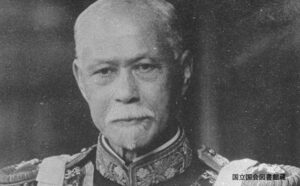(あきこ──死を超えた愛)
In the summer of 1944, on a remote battlefield at La-meng, love blossomed between a blinded Japanese soldier and a woman named Akiko who refused to leave his side. Their vow—“If there is a next life, let us be husband and wife in both body and soul”—and their final choice to spare the life of an enemy child, remind us that even in humanity’s darkest hours, compassion can shine brighter than fear.

A watercolor painting of a burned battlefield with smoke and flames rising in the background. In the center, two white daisies stand side by side, symbolizing love and hope amid devastation.
Introduction – A Flower Amid the Ashes
This is not a story of war. It is a story of love that dared to bloom in a place where death was certain.
In the summer of 1944, at La-meng on the border between Burma and China, some 1,200 Japanese soldiers were encircled and wiped out. This account survives through the testimony of one officer who escaped the battlefield to report what had happened. Among the defenders were a handful of women. Together they endured 120 days of siege against 50,000 troops of Chiang Kai-shek’s army, armed and trained in the American style.
And yet, amid that hopeless battlefield, a fragile but enduring flower bloomed. It was the love between a soldier, blinded in the fighting, and a woman who chose to remain at his side. Their names—Corporal Toyama and Akiko—still echo as a reminder that even in humanity’s darkest hours, love can shine.
Part 2 – Akiko’s Choice and the Vow of Love
Long before the battle reached its height, the women with the garrison were urged to leave. “This place will become a battlefield. It will be dangerous. Go home while you still can,” the officers said. Five Korean women accepted and departed. But fifteen Japanese women chose to remain.
They knew that staying meant almost certain death. Yet by then they had become part of the soldiers’ daily lives—sharing food, laughter, and tears. They were treated as family, bound not only by duty but also by bonds of affection. To leave would have meant survival of the body, but death of the heart. And so they stayed, convinced that they too were members of the garrison.
Among them was a woman named Akiko. She was admired for her beauty and her strong spirit. Corporal Toyama, a tough and blunt soldier, often treated her harshly. Once he went so far as to sneer, “You are nothing but a tool.” Offended, Akiko refused ever again to be near him, no matter what he offered.
When the fighting began, Toyama was blinded by an explosion. It was Akiko who cared for him. In those moments of despair, the truth became clear: beneath the harsh words had always been an unspoken love. Akiko had sensed it, and she too had long carried feelings for the strong-willed corporal.
They were blessed by their comrades and held a wedding on the battlefield. Of course, there was no white dress, no bouquet. Only a small cup of water, passed between them as their friends looked on.
There would be no home, no children, no peace. Yet together they spoke the same vow:
“If there is a next life, let us be husband and wife in both body and soul.”
It was a vow that reached beyond this world, beyond death itself—a pure promise of love in its most fragile and radiant form.
Part 3 – The Final Battle: Choosing Not to Kill
A few days after their wedding, Corporal Toyama and his new wife Akiko stood together on the battlefield. Blind from the blast, Toyama relied on her to be his eyes. She measured the distance of the approaching enemy and whispered guidance as he pulled the pins from grenades.
That day, the third wave came crashing in. Hearing the shrill cries of the attackers, Toyama asked, “Are they boys?”
Akiko looked closely and shouted through the roar of artillery, “Yes—fifteen, sixteen at most!”
For a moment Toyama’s hand froze. Even Akiko faltered. The enemy before them were only children, pressed into battle. Husband and wife hesitated, unable to bring themselves to kill.
In that pause, a grenade thrown by one of the young soldiers landed at their feet. With a deafening explosion, Toyama and Akiko fell together.
On that battlefield, where there would be no children of their own, they could not take the life of another’s child. In that instant, they chose compassion over survival.
Part 4 – Epilogue: What Their Story Means Today
The story of Akiko and Corporal Toyama is not only about the tragedy of war, but about the resilience of love and conscience in its darkest hour. They had no home, no children, and no future—yet in their vow and in their final choice, they affirmed what it means to be human.
Even in a place where death was certain, they chose dignity. Even when survival demanded cruelty, they chose compassion. Their decision to see the enemy’s child as a child, and not merely as an enemy, speaks across time and borders.
History often remembers armies, generals, and treaties. But sometimes it is a single act of love that carries the deepest truth. Akiko and Toyama remind us that humanity is not measured by victory or defeat, but by the courage to remain kind when everything else has been stripped away.
In remembering them, we do not glorify war—we remember the fragile, radiant flame of love that endured even in the ashes. It is a story not only for Japan, but for all who believe that compassion is the true victory of the human spirit.
【Author’s Note】
This story is not meant to glorify war, nor to dwell on tragedy.
It is, instead, a reminder that even in the darkest of times, the human spirit can choose love over hatred, compassion over survival.
Akiko and Corporal Toyama did not live to see peace. Yet in their vow and in their final choice, they showed us that dignity is never lost when one dares to remain kind. Their story is not only Japan’s, but belongs to all of humanity.
May we remember them not as victims of war, but as bearers of a hope that transcends death itself—a hope that love is stronger than fear, and that compassion is the true victory of the human spirit.


